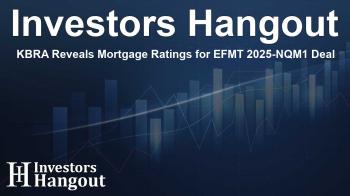KBRA Reveals Mortgage Ratings for EFMT 2025-NQM1 Deal

Understanding KBRA's Ratings for EFMT 2025-NQM1
In a significant financial move, KBRA has announced its preliminary ratings for seven classes of mortgage pass-through certificates associated with EFMT 2025-NQM1. This remarkable transaction, amounting to $269.6 million, focuses on non-prime residential mortgage-backed securities (RMBS). The underlying collateral spans a total of 738 residential mortgages, offering impressive insights into the current mortgage landscape.
Analyzing the Mortgage Pool
The standout characteristic of this mortgage pool is its concentration on loans with alternative income documentation. A staggering 85.0% of the loans were underwritten using methodologies such as bank statements and debt service coverage ratios (DSCR). This strategy marks a significant trend within the mortgage industry, allowing a broader spectrum of borrowers to be considered for loans.
Classification of Mortgages
Within this pool, approximately 55.2% of the loans are categorized as non-qualified mortgages (Non-QM). The remaining loans, making up 45.8%, have been exempt from the Ability to Repay (ATR) and Qualified Mortgage (QM) rules, as they were originated for business purposes, particularly investment properties. This classification highlights the varied nature of the collateral within this RMBS transaction.
KBRA's Rating Methodology
KBRA's comprehensive approach to rating these securities involved a detailed loan-level analysis through its proprietary Residential Asset Loss Model (REALM). This model assesses potential credit losses that could impact the performance of the mortgage pool. Included in this process were thorough reviews from third-party loan file due diligence and sophisticated cash flow modeling to analyze the transaction's repayment structure.
Review of Transaction Parties
The agency also conducted extensive evaluations of the key parties involved in the transaction, along with a detailed assessment of its legal structure and documentation. These robust criteria ensure a thorough understanding of the transaction’s risk profile, providing valuable insights for investors.
Accessing Ratings and Reports
For interested stakeholders, the ratings and relevant documentation can be easily accessed. It is crucial for investors and analysts alike to stay informed about all aspects of such financial instruments, which can have widespread implications in the housing market.
What This Means for Investors
The issuance of preliminary ratings for the EFMT 2025-NQM1 transaction marks an important step in the ongoing evolution of the mortgage-backed securities landscape. As alternative income documentation becomes more prevalent, understanding these new types of collateral is essential for making informed investment decisions.
Kroll Bond Rating Agency Overview
Kroll Bond Rating Agency, LLC (KBRA) is a highly regarded credit rating agency registered with the U.S. Securities and Exchange Commission as an NRSRO. Moreover, KBRA has received recognition in various jurisdictions, including Europe and the UK, and maintains a respected position in the credit agency sector. This enhances its credibility in the market.
Frequently Asked Questions
What is the significance of the EFMT 2025-NQM1 transaction?
The EFMT 2025-NQM1 transaction is significant as it involves a large volume of non-prime mortgage pass-through certificates, reflecting current trends in alternative income documentation.
How does KBRA assess mortgage securities?
KBRA employs a proprietary model called REALM to analyze loan-level data, evaluate cash flow structures, and assess the creditworthiness of the involved parties.
What types of mortgages are included in this RMBS transaction?
The transaction includes a combination of non-qualified mortgages and loans exempt from ATR/QM rules, mainly intended for business purposes such as investment properties.
How can I stay updated on KBRA's ratings?
Investors can access KBRA's ratings and relevant documents through their official website to stay informed about the latest developments in mortgage-backed securities.
Why is alternative income documentation increasingly popular?
Alternative income documentation is becoming more popular as it allows a wider range of borrowers access to credit, essential in supporting homeownership in diverse economic conditions.
About Investors Hangout
Investors Hangout is a leading online stock forum for financial discussion and learning, offering a wide range of free tools and resources. It draws in traders of all levels, who exchange market knowledge, investigate trading tactics, and keep an eye on industry developments in real time. Featuring financial articles, stock message boards, quotes, charts, company profiles, and live news updates. Through cooperative learning and a wealth of informational resources, it helps users from novices creating their first portfolios to experts honing their techniques. Join Investors Hangout today: https://investorshangout.com/
Disclaimer: The content of this article is solely for general informational purposes only; it does not represent legal, financial, or investment advice. Investors Hangout does not offer financial advice; the author is not a licensed financial advisor. Consult a qualified advisor before making any financial or investment decisions based on this article. The author's interpretation of publicly available data shapes the opinions presented here; as a result, they should not be taken as advice to purchase, sell, or hold any securities mentioned or any other investments. The author does not guarantee the accuracy, completeness, or timeliness of any material, providing it "as is." Information and market conditions may change; past performance is not indicative of future outcomes. If any of the material offered here is inaccurate, please contact us for corrections.
